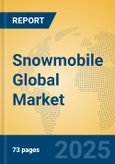Application and Segment Analysis
Snowmobiles are classified into multiple applications, each addressing distinct consumer needs and terrain requirements:Trail Snowmobiles
Designed primarily for groomed trails, these snowmobiles offer balanced performance, comfort, and handling for recreational riders. Their growth is estimated at -2% to -4% annually, influenced by shorter trail seasons due to diminishing snowfall.Sport Trail Snowmobiles
Sport-oriented models emphasize speed, maneuverability, and lightweight construction for recreational and competitive riding. Their decline mirrors overall market trends, with projected negative growth of -2.5% to -4.5% per year.Touring Snowmobiles
These models focus on rider comfort, storage capacity, and stability for long-distance snow travel, appealing to enthusiasts seeking extended trips. Market contraction is expected at -2% to -3.5% annually.Performance Snowmobiles
High-performance machines designed for racing and extreme recreational activities. Sales are projected to decrease by -3% to -4% annually, as climate-induced shorter seasons limit usage opportunities.Utility Snowmobiles
Heavy-duty snowmobiles designed for work in forestry, rescue operations, or remote winter locations. Utility snowmobiles exhibit slightly more resilience to market decline, with projected negative growth of -2% to -3% annually due to continued functional demand in specific sectors.Crossover Snowmobiles
These models combine trail and mountain capabilities, targeting versatility across diverse snow conditions. Declining growth of -2% to -4% is expected, constrained by inconsistent snow coverage.Mountain Snowmobiles
Optimized for deep snow and off-trail conditions, these snowmobiles require specialized features such as lightweight frames and extended tracks. Growth is projected at -2% to -4.5% annually, highly sensitive to snowfall availability.Regional Market Trends
- United States: The largest market, accounting for roughly 45% of global consumption. U.S. snowmobile sales are declining due to warmer winters and reduced snow seasons, despite strong recreational and competitive riding culture. Leading manufacturers such as Yamaha, Polaris, and BRP maintain brand loyalty through product innovation, performance enhancements, and adventure tourism partnerships.
- Canada: The second-largest market at approximately 37% of global share. The Canadian market faces similar challenges from climate change, with traditional recreational regions experiencing shorter snow seasons. Polaris, BRP, and Arctic Cat are key players maintaining sales through regional dealer networks and utility-focused models.
- Northern Europe: Contributing about 12% of global consumption, with countries like Norway, Sweden, and Finland historically supporting snowmobiling through tourism and winter sports culture. Warmer winters are forcing shifts in usage patterns, prompting manufacturers to emphasize high-performance and touring snowmobiles adaptable to shorter snow seasons.
Key Market Players
- Yamaha: Japanese manufacturer producing a full range of snowmobiles, emphasizing reliability, performance, and innovation in trail and sport categories.
- Bombardier Recreational Products (BRP): Canadian company with a strong presence in North America and Europe, producing versatile snowmobiles across touring, sport, and utility applications.
- Arctic Cat: Focuses on high-performance snowmobiles for sport, trail, and mountain applications, maintaining strong brand recognition in North American markets.
- Polaris: Offers a broad portfolio across trail, utility, and performance segments, known for durability, innovation, and engagement in recreational motorsports.
- Taiga Motors Inc: A newer entrant emphasizing electric snowmobiles, highlighting sustainability and innovation in an industry challenged by climate change.
Porter’s Five Forces Analysis
Supplier Power: Moderate
Snowmobile manufacturers depend on specialized components such as engines, track systems, and suspension components. Limited suppliers for high-performance engines provide moderate bargaining power, though multiple sources exist for standard components.Buyer Power: Moderate
Consumers and utility buyers exert influence through brand preference and pricing sensitivity. Enthusiast riders demonstrate loyalty to established brands, mitigating some buyer power.Threat of New Entrants: Low
High capital investment, engineering expertise, compliance with safety regulations, and dealer networks create substantial barriers for new entrants. Emerging electric snowmobile manufacturers face technological challenges and market acceptance hurdles.Threat of Substitutes: Moderate
Alternative winter vehicles, such as off-road UTVs or tracked utility vehicles, can partially substitute snowmobiles in utility applications. Recreational substitutes include ski tourism and snowboarding, creating moderate substitution risk.Competitive Rivalry: High
Competition among global manufacturers is intense, particularly in North America and Northern Europe, with differentiation based on engine performance, handling, durability, and brand reputation. Product innovation, electrification, and adaptation to shorter snow seasons are becoming key competitive levers.Market Opportunities and Challenges
Opportunities
The Snowmobile market can leverage innovation in electric propulsion, lightweight materials, and multi-terrain capabilities. Adventure tourism, winter sports events, and recreational diversification create niche growth prospects. There is also potential for geographic expansion in areas with reliable snowfall or artificial winter environments.Challenges
Global climate change presents a critical challenge, reducing snow coverage and shortening operational seasons. Rising temperatures, unpredictable weather patterns, and environmental regulations further constrain demand. Market contraction is compounded by aging consumer demographics in traditional regions, high ownership costs, and alternative recreational options. Manufacturers must focus on product adaptation, sustainability, and new market strategies to mitigate these risks and sustain business performance.This product will be delivered within 1-3 business days.
Table of Contents
Companies Mentioned
- Yamaha
- Bombardier Recreational Products (BRP)
- Arctic Cat
- Polaris
- Taiga Motors Inc








